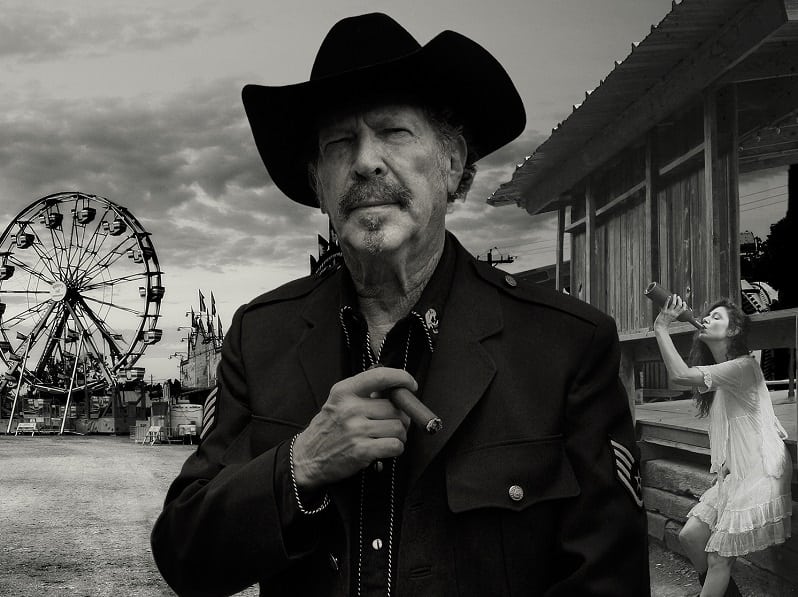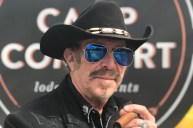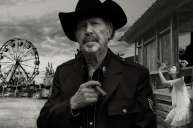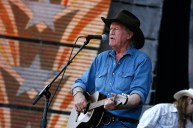In his various roles, Texas-based singer, songwriter, author and former gubernatorial hopeful Kinky Friedman blends the weathered wisdom of Tom Waits with the quick-wittedness of a modern-day Will Rogers. To country fans, the Kinkster is best-known as the leader of the Texas Jewboys, the Jewish voice of outlaw country in the socially-turbulent '70s. Expect a more introspective, songwriter-driven and gravely-voiced take on the music that's long touched country fans--from Nelson Mandela on down--on new album Circus of Life, out July 3 via Echo Hill Records.
Videos by Wide Open Country
After decades of sparse releases bolstered by cover songs, Friedman took a break from writing mystery novels and campaigning for public office to cut his first album of all-original material in about 40 years. With a famous friend's encouragement, the Texan behind "They Don't Make Jews Like Jesus Anymore," "Get Your Biscuits in the Oven and Your Buns in the Bed" and other classics builds on the quality of 2015's The Loneliest Man I Ever Met, the album that brought us a solid cover of Bob Dylan's Nashville-made "Girl From the North Country."
Today, Wide Open Country offers a couple of exclusives to hold fans over until early July. First, we premiere "Spitfire." It's a gentle ballad that references World War II and Winston Churchill while honoring folk music's European roots. Friedman brings the story to life with an all-star supporting cast, including Texas Jewboy alum "Little Jewford" Shelby on piano and country music's go-to harmonica player, Mickey Raphael.
https://soundcloud.com/telephone-slim/sets/spitfire/s-YswDU
Secondly, we offer a brief excerpt from a in-person chat with Friedman, during which he opened up about how Willie Nelson and Andy Griffith played a direct role in the creation of Circus of Life and how an earlier album reached the ears of Mandela.
Wide Open Country: The story's out there that Willie Nelson called you up and encouraged you to write new songs. Is that sort of his method—calling up songwriters he knows and respects and lighting a fire under them?
Friedman: Well, from a man of Willie's age, it kind of makes you angry when you get older. I'm already there at 73, though I read at the 75-year-old level. I find it irritating to see young people run around and do everything they're doing. With that as a backdrop, Willie shouldn't really care about anybody and inspiring younger people. But he's been my shrink, kind of, over the years. He's never told me no—only one time. He's done a million things, and I can't think of one I've done for him, really, so I did this song "Autographs in the Rain."
Anyway, so Willie calls at 3 o' clock in the morning, and I'm watching Matlock. This is all true stuff. He's in Hawaii. He asks me what I'm doing, and I say, 'I'm watching Matlock.'" Willie says, 'That's a sure sign of depression. Turn Matlock off, Kinky, and start writing.' I hadn't written (songs) in 35 years or 40 years. So, I got inspired, I kind of started writing songs again. I wrote a dozen in about a month. That's called the Matlock Collection. Those are the ones that are on the record Circus of Life.
You can argue about it, but when you hear these and you have a chance to think about them, they are country but they're country Leonard Cohen with a little Kris Kristofferson thrown in, back when he was the most talented janitor in Nashville.
A few songs on Circus of Life are co-writes. Have you ever done co-writes in a Music Row sense were you go in an office with a group of people?
No, that's the whorehouse method. They tell them just what they want, you know? Give us a little bit of Roger Miller and a little bit of this and a little bit of that. That's not the way the really great ones did it.
There's the story of Willie and Merle walking around Nashville right when Kristofferson was exploding. Merle was depressed. Merle was saying, "It looks like Kris is the best songwriter in town right now." And Willie says, "After you and me." Which turned out to be about right. Kris is a great one, so I'm not subtracting from him in any way. In fact, I hear a little bit of early Kris in these songs and, like I said, a little Leonard Cohen. If I just heard them, I'd say that.
So, these songs are either divinely inspired or from another planet. I'm not sure. They're definitely written not regarding any sort of commerciality whatsoever. Never asked the question, "Who would play this? Will they like it?" Never thought of that. Not one time.
Having written detective novels and other types of books over the years, is there a kind of different mindset you get in if you're going to write songs versus a mystery or something funny or whatever?
Oh yeah. Writing a book is like a bad marriage. You stay with it. I stay with it. I keep a typewriter there and go back and forth to it until it's done. Whereas songs really require inspiration. I'd say that "Jesus in Pajamas" is the first one in the Matlock group. And the Matlock thing is a lesson from Willie as a shrink kind of a thing. What he's saying is that we all have a Matlock. Maybe yours is shooting up heroin, but that's an obvious one. You've got to stop that, Bobby! But beyond that, there might be others that we don't see. There's something that is your Matlock, and if you turn it off, who knows what'll result.
Kind of get off your butt and see what happens...
If you're watching Matlock re-runs at 3 o'clock in the morning, it's not a good sign.
It's not like it's The Andy Griffith Show and you might see The Dillards.
Andy Griffith is the greatest! He's wonderful. But Willie was right about that, and he usually is. His goal is to get to the next town without slicing his wrist. That's why I'm doing this Willie Nelson-style tour that does not take a break. It's about 30 shows consecutively on the East Coast of our country, starting July 1 in Pittsburgh.
When you see some of the young artists like Margo Price or Joshua Hedley or others who are more independently-minded, are you inspired by that? Do you feel like you did a good job in maybe letting them know in your own way that you don't have to worry about, you know, being on a big label or being on the radio or being at the awards shows—not that those are bad things?
They are bad things. The award thing is pure politics. Almost never does the guy who should've got the award get the award, but that's been the way it is.
Chuck Glaser, Tompall's brother who produced my first record Sold American here in 1973, told me that once you record it, you never know who's going to hear it. That's when the Nelson Mandela incident happened. It wasn't an incident. It stretched over several years, with Mandela playing this song "Ride 'Em Jewboy" on a smuggled tape cassette in his prison cell on Robben Island. When I learned a little more about that, I was in South Africa on a book tour for God Bless John Wayne, and I was just thinking this is a much bigger thing than being nominated for a Grammy. This is a real award that I got by virtue of country music.




